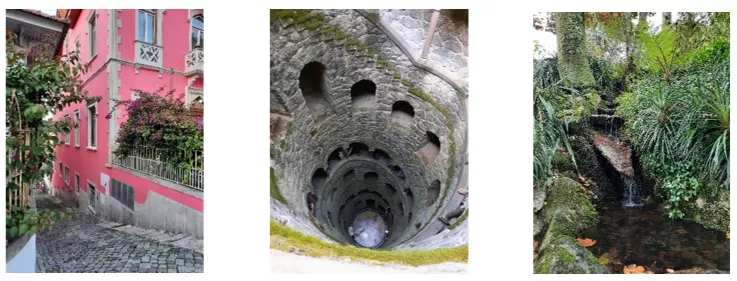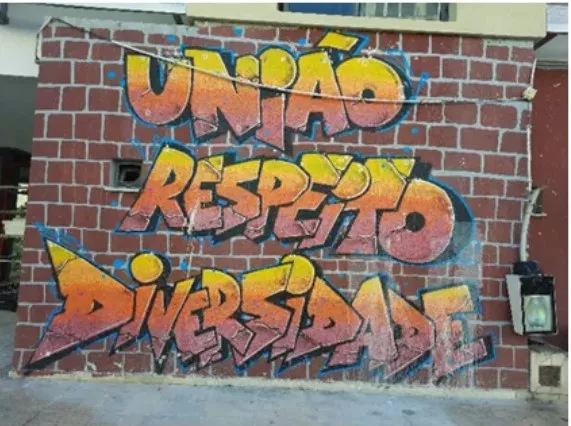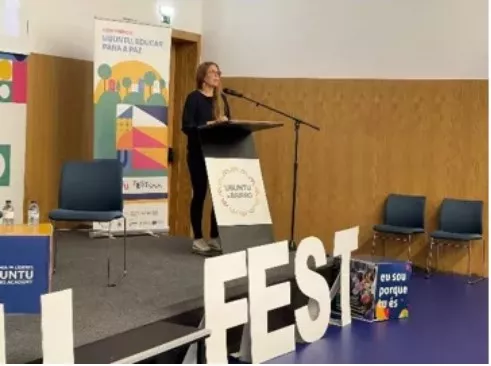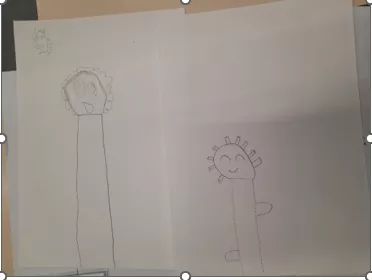"Ubuntu" – education for peace and humanity
The Erasmus+ mobility and job shadowing offered me an opportunity to travel to Portugal, and I spent ten professionally enriching, beautiful and eye-opening days between October 19th–29th 2024 in Lisbon and Northern Portugal. My target organisation was Instituto Padre Antonio Viera (IPAV) and more specifically their Ubuntu Leaders Academy (ULA) that is a project to empower young people (aged 15–35) by non-formal education. The education is based on a methodology that has its roots in the philosophy of Ubuntu.
The word Ubuntu is an African word, and it means ”I am because you are”. On a quick reading, it may not be easy to understand what it really means. To be honest, I needed to slow down, reflect, and really feel out the sentence that is deep and philosophic, too. After the journey, I must say that you really learn Ubuntu with other people and by living and doing. It means kind acts towards each other, seeing that there is good inside of every one of us and that there is something bigger that binds us together as a human race that goes over the cultural or religious boundaries that people have created. For me, it is a way to peace. Ubuntu has often been explained that we all as humans are intertwined with each other with many different layers and that we need other people and that beautiful connection to become whole and complete. What is more beautiful than a real connection and respect to another living being?
The Ubuntu Leaders academy has been recognized by the European Commission among the 12 most relevant best practices projects. Education has been delivered in many countries in Africa, Southern America and South-East Asia. In Portugal, the Ubuntu week program is widely spread to elementary schools all around the country. There has been education also in Europe besides Portugal and its neighboring country, Spain. Pilots have been run in, for example, in Greece, Austria, Germany, and Poland. Perhaps one day in Finland, too?
There are three principles in ULA education. Those are Servant Leadership, Ethics of Care, and Building Bridges. Education is built on five pillars that are Self-Knowledge, Self-Reliance, Resilience, Empathy and Service. For more information about their methodology and impact for peace education I warmly recommend that you to dive into the Ubuntu Leaders Academy's webpages.
I got my first touch in the philosophy of Ubuntu already years ago through the books of Archbishop Desmond Tutu and Nelson Mandela. Also the newer book from Tutu´s granddaughter Mugni Ngomane, Everyday Ubuntu, gave me a lot to think about. There is something really deep in the message of Ubuntu that touched me as a path to follow and share. It invites us to walk together towards good humanity. I believe this is exactly what the world needs today more than ever! The message is about hope, living in harmony, loving our fellow human beings, learning to forgive, and understanding the interconnectedness that we share as humans. There is a key to peace, through Ubuntu, I believe.
The goals for my Erasmus+ mobility were to learn and expand my knowledge about community building and communality as a tool for engaging people. I also hoped to get new ideas for the field where I work in adult education as a coordinating teacher. I also wanted to improve my language skills through versatile conversations with different people and most of all learn something new about intercultural and interfaith dialogue.
The weekend I arrived in Portugal I visited mystical Sintra and its cultural heritage. Sintra is one of the Unesco world heritage sites. It is a green, fresh and amazingly beautiful city only 30 km from Lisbon. In Sintra, I walked a lot and visited its famous sights like the Castle of the Moors, Pena's Palace and Quinta da Regaleira. I ate in the local restaurants and just enjoyed the historical and mystical atmosphere of the city. If you ever visit Portugal, don´t skip this amazing place!

I felt warmly welcome the day my job shadowing started and when I arrived at the IPAV office. The whole programme was carefully planned, and I must say that during my mobility I saw a lot, got understanding of the diversity in society and found myself in deep and eye-opening conversations with ULA staff. I got to see Ubuntu in action and the methodology used with different target groups (seniors, immigrants, elementary and junior high school pupils, and parents). It was great to witness how versatile and rich the methodology is and how it can be used to empower and make a difference also in very vulnerable groups and communities.

On the last weekend, I travelled with ULA staff to Northern Portugal to Vila Nova de Gaia for the Ubuntu Fest that focused this year on peace education. I held a presentation about the Finnish education system and presented some peace education models from Kuopio and Finland.

We also visited schools and saw Ubuntu in action with children and parents that were educated on emotional intelligence. One thing that touched me was a conversation with an eight-year-old boy while visiting a peace education lecture in a school. The children were instructed to draw a flower and think of something that is wrong in the world or what needs improvement. After that they were instructed to think what kind of a ”special power” their flower could bring to the world to heal the thing that they thought is wrong. He said to me that he thinks there is too much violence (or hitting as he told it) in the world and that the special power of his flower is hugging. His flower teaches us to give hugs to heal. I thought that was wonderful and shows also us adults that sometimes the answers are very simple. Imagine when you are angry and somebody really warmly gives you a good hug… that heals, right. Children can really be good teachers if we listen to them.

So, what did I learn from my journey? I must say a lot. I learned that communality is the base for everything. Remembering the common goals as well as the support provided by the community members encourages us to continue. The feeling of belonging and being an active part of the community gives us power to continue. It is important to see the meaning in what we do in life. If it has to do something with helping others or bringing good to this world, we are on a right path. What do you think?
We need each other as a human race to be able to live in peace with each other on this planet. Ubuntu teaches us to see unity in diversity as they told me. I also learned that hard life experiences can turn out to be our strengths. Those can bring an inspiring story to tell to others. Trusting another person and seeing their strengths really gives an upward rising spiral of positivity and goodness. So let´s lift each other up with our actions and words rather than press them down!
One thing that I learned was that we can all do good things for each other and for the planet. So let´s not wait for the ”moment to be perfect” or ”skills to develop more" before starting. Everyone can and together we will move mountains! Let´s believe in that.
What will stay deep in my heart were all the beautiful encounters with ULA staff, teenagers in the secondary school, seniors in the village and their social workers, children in the elementary schools and their teachers, young empowered people and their supervisors arranging the most beautiful dinner for us in Porto, and Passasabi residents community association introducing community building for immigrants that have arrived from Kap Verde. Also the discussions with parents of the school children and wise and heartful partners of IPAV that I met and all the other people that I had a conversation with on my journey.
I got so many ideas for intercultural dialogue as well as for the communality in our adult education center in Kuopio. It would be wonderful to arrange an intercultural day for the immigrants that learn Finnish language with us. During that day the students could present their home country and serve some local food, tell about their culture, perhaps teach a little bit of their own language, and everyone would get to know each other better. The whole language department in our academy would turn into a rich mix of cultures where everyone could pop in to learn more. Another idea that started to “cook slowly” in my mind was a senior student community to bring together people, engage them for lifelong learning and volunteering, and also hearing the needs of older people for creating the curricula to more meaningful subjects and themes.
I must say that all my expectations for this journey were exceeded. I want to thank from the bottom of my heart first of all The Erasmus+ programme for enabling this journey and of course IPAV for the heartful co-operation and having me in their community for learning.
For more information:



